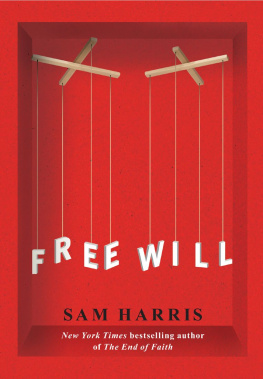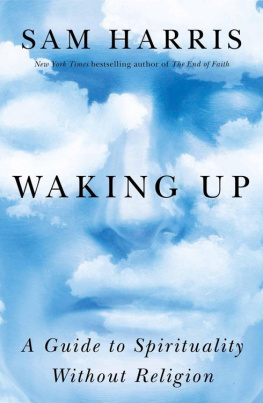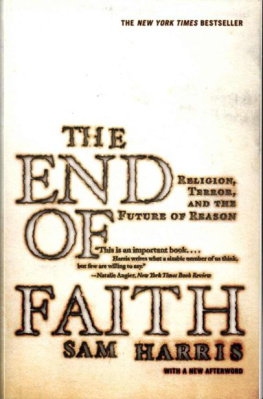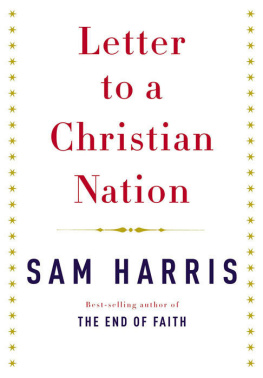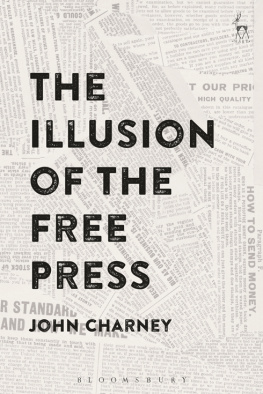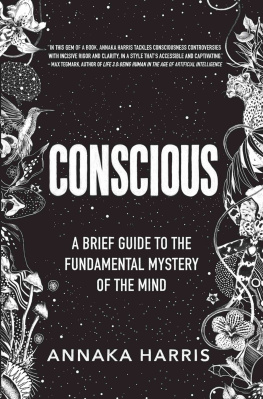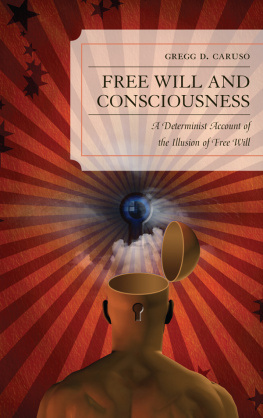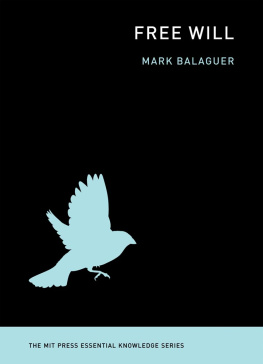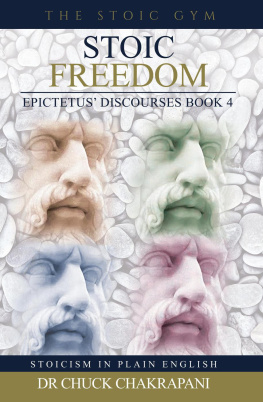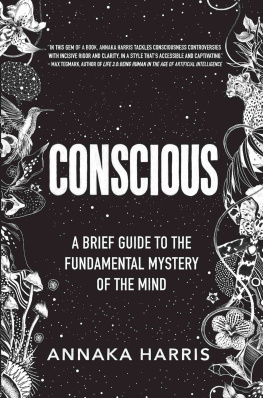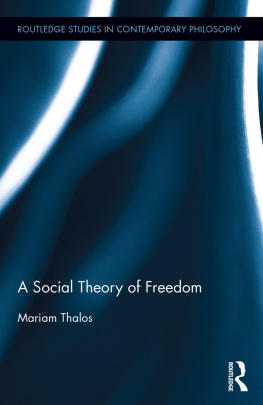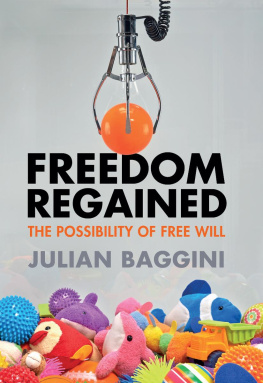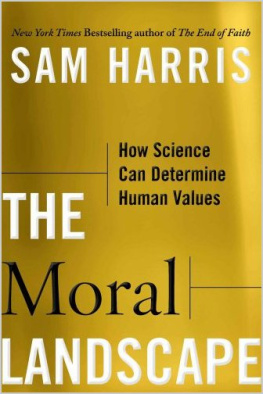Free will is an illusion so convincing that people simply refuse to believe that we dont have it. In Free Will , Sam Harris combines neuroscience and psychology to lay this illusion to rest at last. Like all of Harriss books, this one will not only unsettle you but make you think deeply. Read it: you have no choice.
JERRY A. COYNE, Professor of Ecology and Evolution, University of Chicago, and author of Why Evolution Is True
A BELIEF IN FREE WILL touches nearly everything that human beings value. It is difficult to think about law, politics, religion, public policy, intimate relationships, moralityas well as feelings of remorse or personal achievementwithout first imagining that every person is the true source of his or her thoughts and actions. And yet the facts tell us that free will is an illusion.
In this enlightening book, Sam Harris argues that this truth about the human mind does not undermine morality or diminish the importance of social and political freedom, but it can and should change the way we think about some of the most important questions in life.
In this elegant and provocative book, Sam Harris demonstrateswith great intellectual ferocity and panachethat free will is an inherently flawed and incoherent concept, even in subjective terms. If he is right, the book will radically change the way we view ourselves as human beings.
V. S. RAMACHANDRAN, Director of the Center for Brain and Cognition, UCSD, and author of The Tell-Tale Brain
Brilliant and wittyand never less than incisive Free Will shows that Sam Harris can say more in 13,000 words than most people do in 100,000.
OLIVER SACKS
Many say that believing that there is no free will is impossibleor, if possible, will cause nihilism and despair. In this feisty and personal essay, Harris offers himself as an example of a heart made less self-absorbed, and more morally sensitive and creative, because this particular wicked witch is dead.
OWEN FLANAGAN, Professor of Philosophy, Duke University, and author of The Really Hard Problem
If you believe in free will, or know someone who does, here is the perfect antidote. In this smart, engaging, and extremely readable little book, Sam Harris argues that free will doesnt exist, that were better off knowing that it doesnt exist, and thatonce we think about it in the right waywe can appreciate from our own experience that it doesnt exist. This is a delightful discussion by one of the sharpest scholars around.
PAUL BLOOM, Professor of Psychology, Yale University, and author of How Pleasure Works

PHOTOGRAPH BY JENNIFER ROPER
SAM HARRIS is the author of the bestselling books The End of Faith, Letter to a Christian Nation, The Moral Landscape, and Lying. The End of Faith won the 2005 PEN Award for Nonfiction. His writing has been published in over fifteen languages. Dr. Harris and his work have been discussed in The New York Times, Scientific American, Nature, Rolling Stone, Newsweek, Time , and many other publications. His writing has appeared in The New York Times , Los Angeles Times , The Times (London), The Boston Globe, The Atlantic, Newsweek, Annals of Neurology , and elsewhere. Dr. Harris is cofounder and CEO of Project Reason, a nonprofit foundation devoted to spreading scientific knowledge and secular values in society. He received a degree in philosophy from Stanford University and a PhD in neuroscience from UCLA. Please visit his website at www.samharris.org.
MEET THE AUTHORS, WATCH VIDEOS AND MORE AT
THE SOURCE FOR READING GROUPS
JACKET DESIGN BY DAVID DRUMMOND
COPYRIGHT 2012 SIMON & SCHUSTER

Also by Sam Harris
The End of Faith
Letter to a Christian Nation
The Moral Landscape
Lying


FREE PRESS
A Division of Simon & Schuster, Inc.
1230 Avenue of the Americas
New York, NY 10020
www.SimonandSchuster.com
Copyright 2012 by Sam Harris
All rights reserved, including the right to reproduce this book or portions thereof in any form whatsoever. For information address Free Press Subsidiary Rights Department, 1230 Avenue of the Americas, New York, NY 10020.
First Free Press trade paperback edition March 2012
FREE PRESS and colophon are trademarks of Simon & Schuster, Inc.
The Simon & Schuster Speakers Bureau can bring authors to your live event. For more information or to book an event contact the Simon & Schuster Speakers Bureau at 1-866-248-3049 or visit our website at www.simonspeakers.com.
Library of Congress Cataloging-in-Publication Data
Harris, Sam,
Free will / Sam Harris.1st Free Press trade pbk. ed.
p. cm.
1. Free will and determinism. I. Title.
BJ1461.H2785 2012
123'.5dc23 2011052177
ISBN 978-1-4516-8340-0
ISBN 978-1-4516-8347-9 (eBook)
For Hitch
Thank you for purchasing this Free Press eBook.
Sign up for our newsletter and receive special offers, access to bonus content, and info on the latest new releases and other great eBooks from Free Press and Simon & Schuster.
or visit us online to sign up at
eBookNews.SimonandSchuster.com
Contents
FREE WILL
The question of free will touches nearly everything we care about. Morality, law, politics, religion, public policy, intimate relationships, feelings of guilt and personal accomplishmentmost of what is distinctly human about our lives seems to depend upon our viewing one another as autonomous persons, capable of free choice. If the scientific community were to declare free will an illusion, it would precipitate a culture war far more belligerent than the one that has been waged on the subject of evolution. Without free will, sinners and criminals would be nothing more than poorly calibrated clockwork, and any conception of justice that emphasized punishing them (rather than deterring, rehabilitating, or merely containing them) would appear utterly incongruous. And those of us who work hard and follow the rules would not deserve our success in any deep sense. It is not an accident that most people find these conclusions abhorrent. The stakes are high.
In the early morning of July 23, 2007, Steven Hayes and Joshua Komisarjevsky, two career criminals, arrived at the home of Dr. William and Jennifer Petit in Cheshire, a quiet town in central Connecticut. They found Dr. Petit asleep on a sofa in the sunroom. According to his taped confession, Komisarjevsky stood over the sleeping man for some minutes, hesitating, before striking him in the head with a baseball bat. He claimed that his victims screams then triggered something within him, and he bludgeoned Petit with all his strength until he fell silent.
The two then bound Petits hands and feet and went upstairs to search the rest of the house. They discovered Jennifer Petit and her daughtersHayley, 17, and Michaela, 11still asleep. They woke all three and immediately tied them to their beds.
At 7:00 a.m., Hayes went to a gas station and bought four gallons of gasoline. At 9:30, he drove Jennifer Petit to her bank to withdraw $15,000 in cash. The conversation between Jennifer and the bank teller suggests that she was unaware of her husbands injuries and believed that her captors would release her family unharmed.

